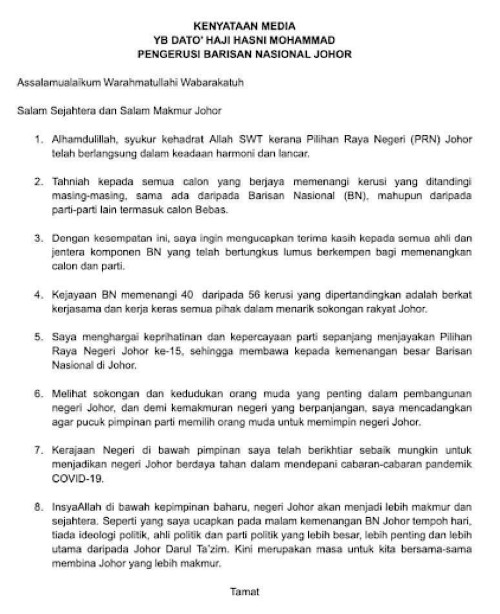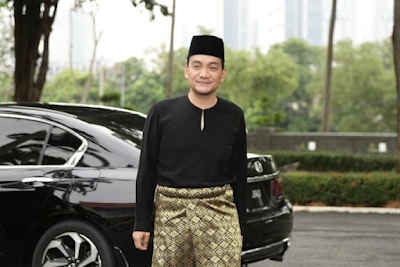Ini Onn Hafiz Ghazi (gambar atas) ialah anak saudara Hishamuddin, Hishamuddin dan Najib adalah sepupu juga. Onn Hafiz Ghazi di sebut sebagai bakal MB Johor yang baru, Najib dah ator semuanya ini, jadi jangan fikir Onn Hafiz Ghazi telah diberikan pekerjaan itu hanya kerana dia masih muda.
Sapa Onn Hafiz Ghazi? Onn Hafiz Ghazi adalah orang sama yang menerima RM240k daripada bapa saudaranya, Najib Razak, untuk menguruskan Malaysian Digest yang tidak berfungsi? Onn Hafiz Ghazi adalah saksi pendakwaan No.16 dalam perbicaraan SRC Najib. Ingat!!!
Holy moly. Najib is creeping back in again. And the question to be asked is,how does it feel to be fucked by your own party Dato Haji Hasni Mohammad? It's what Johor BN voters want or otherwise?...
PM9 di tolak tepi...
Mawar oh mawar keluar PAS tak bermakna keluar Islam...
Voter fatigue and the devil you know...
The Johor state elections on March 12 saw the lowest voter turnout compared with other recent state polls. This is surprising as Johor has always been a hotbed of political activity. Only 54.9%, or 1,426,573, of the 2,597,742 registered voters cast their ballots in Johor. In 2018, a total of 1,335,362 voters, or 74.57%, of eligible voters had cast their votes.
Commenting on the low voter turnout on polling day, menteri besar-designate Hasni Mohammad said a possible reason was the fear of catching Covid-19. He suggested that the elderly could have been worried about their health due to the pandemic. “Although the voter turnout as of 4pm is still low, where it is less than 50%, we expect the number to increase before voting time ends at 6pm,” the Johor Barisan Nasional chairman and Benut assemblyman had said. It didn’t increase much.
But what happened to all those new young voters that Johor is supposed to have? There are 749,731 new voters in Johor following the amendment to the constitution allowing voters aged 18 to 21 to also cast their ballots. It would be interesting to know exactly how many of these young people actually came out to vote. One would have thought that these young voters – making up 6.67% of total voters – would be enthusiastic about being the first in the 18-21 age bracket to participate in the election process in Malaysia.
Even if we agree with Hasni that senior citizens were afraid to come out, what about the voters aged 21 to 29 who form 21.86% of the electorate – the largest group of voters in the state? What about the second largest group aged 30 to 39, who form 21.59% of voters? Let’s look at the voter turnout in the Melaka state elections: A total of 326,068 voters, or 65.85%, cast their ballots. Covid-19, in fact, was more severe in November last year as the deadlier Delta variant of the SARS-CoV-2 virus was still very much active.
Today, most Malaysians are being attacked by the milder Omicron variant. Also, so many of the restrictions have been lifted now, indicating that the health authorities are satisfied that the danger has lessened significantly. If we consider the Sarawak state elections of last December, we find that a total of 759,627 voters, or 60.67%, cast their votes despite the Delta and Omicron variants and despite tighter voting rules and SOPs. In the Sabah state elections, 749,083 voters, or 66.61%, cast their votes, and the elections were held when Sabah was seeing a spike in cases.
No, fear of Covid-19 cannot be the main cause of the low turnout. Even the fact that many Johoreans working in Singapore could not cast their votes is not the crucial factor. I think the more important factor is voter fatigue. From what I’ve read, including on social media, people were fed-up with the political power play by politicians and their parties. Many felt another election during the pandemic was totally unnecessary.
I believe many Johor voters were sick of the antics of political leaders. They were fed-up that politicians and their supporters threw caution to the wind during many of the political gatherings. For instance, Umno’s top draw in the Johor campaign, Najib Razak, had been compounded at least five times for flouting Covid-19 SOPs.
A total of 223 candidates from 10 political parties and 16 independents took a shot at becoming an assemblyman. If I had been a voter in Johor, I would have been put off by the number of candidates and parties which contested in the Johor polls. I’m sure that was the feeling of many of those who did not vote.
Out of the blue, Sabah and Sarawak-based parties such as Warisan and Parti Bangsa Malaysia (PBM) had entered the fray, in addition to new parties Muda, Pejuang and Parti Bumiputera Perkasa Malaysia (Putra). Voters already had to contend with regulars BN, PN, Pakatan Harapan (with its components PKR, DAP and Amanah) and Parti Sosialis Malaysia (PSM).
I believe the crowded contest was interpreted by voters to mean that these politicians and their parties were not interested in the people’s welfare but in their own well-being; that they were all simply hungry for power. I’m sure there are still many who cannot comprehend how Barisan Nasional and Perikatan Nasional could attack each other so rabidly in the Johor hustings yet sit together in government at the federal level as if everything is fine and dandy.
Also, the bickering between opposition parties such as PH and Pejuang and the decision of PKR to contest under its own logo while DAP and Amanah contested under the PH logo would have been difficult to digest.
Many may have been unable to stomach the way some politicians attacked each other or their parties, all while trying to look like saints. There was a cacophony of voices when they were desperately searching for a single voice that they could trust. So, many voters decided to simply shut down the noise and stay at home.
Others, however, decided to vote but vote in such a way that one party or coalition would be in control. They were looking for some sense of stability so that their lives could proceed as normal. That is why those who voted did not give their support to smaller and untested parties such as Pejuang, Warisan, Putra and PBM. All candidates from these parties, including 42 from Pejuang, lost their deposits.
Some of them were probably thinking, based on what had happened post-GE14, that even if they were to vote for one candidate, he might hop over and join another party after winning. Those who voted, may have had this in mind in deciding to ensure one party or coalition got a sufficient majority so that party-hopping would not be a problem.
Most of them, therefore, decided to give their votes to BN because it is better to deal with the devil you know than the devil you don’t. Whatever it is, Johor voters probably wanted to send this message to politicians and their parties: We have had enough, just do what you want to do and let us get on with our lives in this economically challenging pandemic time. - A.Kathirasan
cheers.











No comments:
Post a Comment